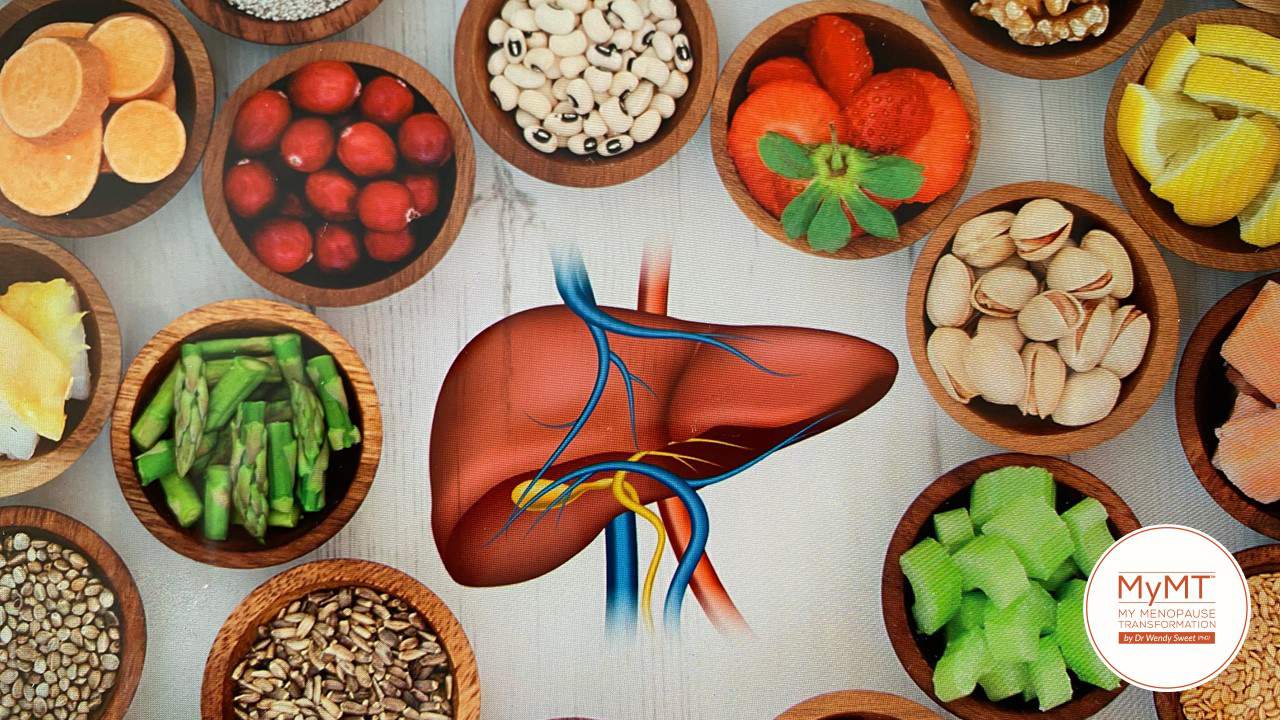It took me a long time to turn my back on the popular Keto diet and explore the influence that menopause hormonal changes have on our liver and gallbladder as we age.
Despite my efforts at daily exercise, eating well and trying to look after myself, the menopause weight stacked on.
All of my clothes felt tight. It was depressing. But my angst about my weight paled in comparison to the arrival of a new worry – heart palpitations, high blood pressure and cholesterol levels that were climbing through the roof. I could see my Doctor reaching for the prescription pad ready to write ‘statins’. My only thoughts were of my mother in her early 60’s who put on lots of weight, developed hypertension, took statin medication for years and ended up having a stroke in her early 80’s. Suddenly the ‘healthy ageing trajectory that I thought I was on, seemed hopeless. Not only due to my family history, but because of what I was learning in my doctoral studies. The research on women’s health as they aged, presented similar declining-health trajectories.
But acquainting myself with this research was my saving grace. It allowed me to better understand how to turn around my health at a time of life, when our changing hormonal environment makes us more vulnerable to weight gain and the various co-morbities such as heart disease and Type 2 diabetes. It’s part of the reason that menopause weight gain shouldn’t be ignored.
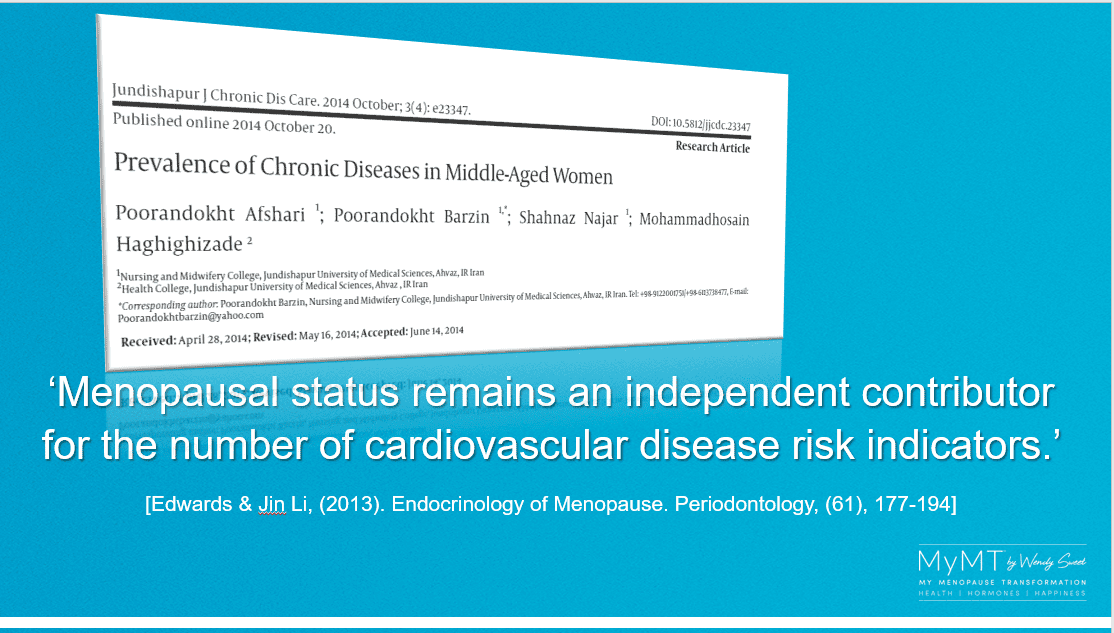
Professor Carla Brady has researched the liver in menopause. Her work helped me understand the importance of our liver and gallbladder as we age.
“There is an interplay of hormonal issues and ageing that create a unique path for development of liver problems and liver disease in menopausal women, making chronic liver disease a significant burden on women’s health in their post-menopause years.” [Brady, C., 2015].
What I discovered was how the liver and gall-bladder both change in structure and function as we move towards post-menopause. Therefore, the emphasis on a diet high in fats and proteins as are popular today, wasn’t helpful for my upper abdominal weight gain, bloating and increasing cholesterol levels. My increasing fatigue also made sense. On oral HRT at the time, I also learnt that HRT places an additional burden on the liver, as do all medications that many women take as we move through menopause.
Our health chaos arrives slowly. And menopause is the ‘perfect storm’ for these changes. Not sleeping, poor temperature regulation, changing weight, high total and LDL cholesterol, bloating and joint pain may send us into further health chaos as we move through menopause. Whilst the focus is usually on cardiac health when we visit our Doctor with changing cholesterol and weight during menopause (which it should be), how many of us are being told that our liver health matters too? I will let you reflect on that.
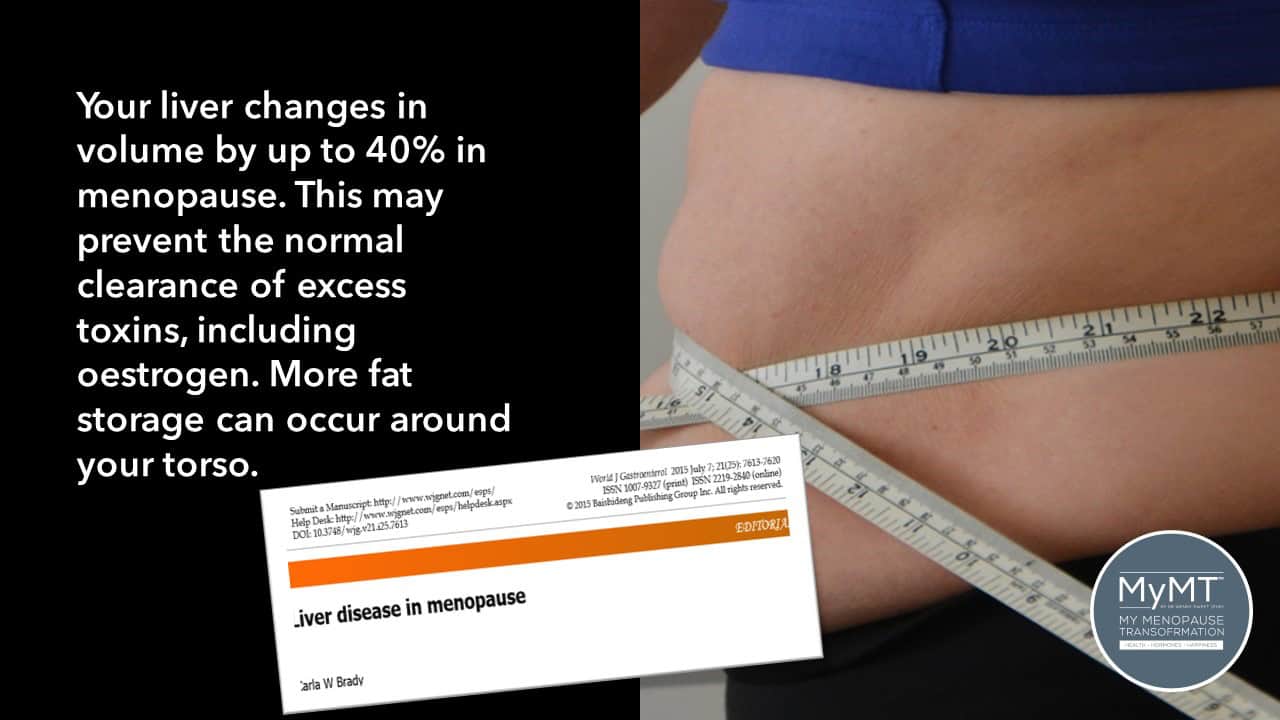
In both of the MyMT™ programmes, I have an entire 1 hour podcast/webinar devoted to the scientific evidence about how to turn around our liver health in a way that helps to rejuvenate our ageing liver. The liver is the only organ that is ‘adaptogenic’ which means that it heals and repairs, but we need to achieve this in a systematic way over at least 6 weeks.
For example, food based nutrients continue to be investigated for their role in changing metabolic pathways involved in the detoxification process not only in the liver, but throughout our body (Hodges & Minich, 2015). If you are paying lots of money for expensive supplements that ‘detox’ you, then please know that allium foods (onions, garlic and leeks) top the list of foods that have known detoxification actions in the body.
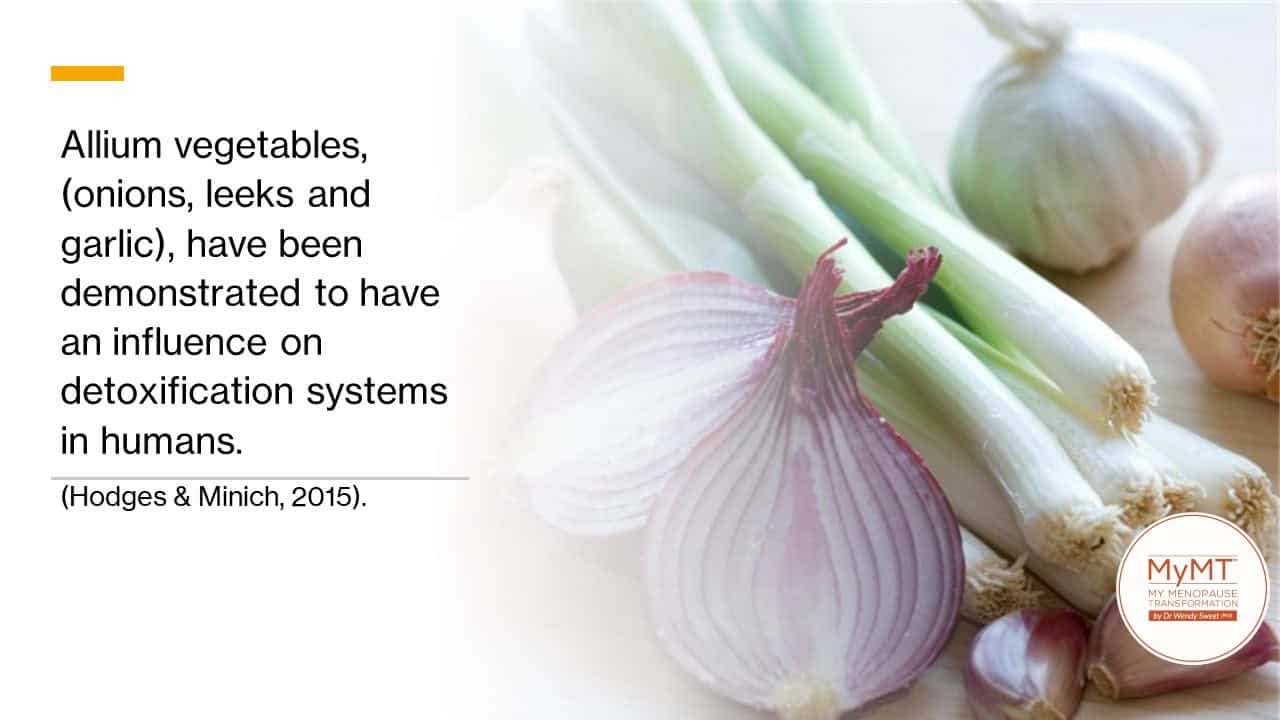
Once we understand the metabolic pathways that help to rejuvenate our liver, we have the ability to turn around our energy, weight, cholesterol and bloating at this time of life. As I discovered myself, if we are going to change our health and manage our weight as we age, then the liver is the organ to focus on first.
I worry about women in menopause going on the high-fat, high-protein diets that are popularised as a ‘one-size-fits-all’ diet these days. These diets don’t fit with the current scientific research on how we need to eat as we move through menopause.
This is why positioning our menopause transition in women’s ageing and following the women’s health research changed my life too. It allowed me to better understand how our body is adjusting to our changing hormones in menopause – some of these changes have a lot to do with how the liver and gallbladder change as we get older. And for those of you who have had your gallbladder removed over the years, there are changes to your fat intake that you may need to adjust as well because not having a gall-bladder impacts the dumping of emulsified fats directly into your small intestine.
Understanding that the liver is the hero in the story of your mid-life weight loss, energy and health as you age is important.
The liver plays a central role in all metabolic processes in the body, especially in fat metabolism.
In fat metabolism the liver cells break down fats and produce energy. These cells also produce about 800 to 1,000 ml of bile per day. This yellow, brownish or olive green liquid is collected in small ducts and then passed on to the main bile duct, which carries the bile to a part of the small intestine called the duodenum. Bile is important for the breakdown and absorption of fats. If you don’t have a gallbladder, then you don’t have this storage capacity role, so the type of fats and when you eat them matters to you as well.
As we age our liver is changing. It shrinks in size and the gall-bladder produces less bile. Bile is the substance that helps to emulsify or break down fats. If our diet is high in fats (including animal fats), then our gallbladder cannot cope with the volume of fats that it has to emulsify. Our gall-bladder, which stores bile, where fats are broken down further, also changes.
We have around 20% less bile being produced as we move through menopause.
Changes in diet and lifestyle have led to a dramatic increase in the prevalence of obesity and metabolic syndrome in Western countries and many Asian countries. This has resulted in a significant increase in the incidence of non-alcoholic fatty liver disease (NAFLD), [Watanabe, et al, 2015). Non-alcoholic Fatty Liver Disease (NAFLD) doubles in incidence in women as they move through menopause. This condition increases inflammation in the liver.
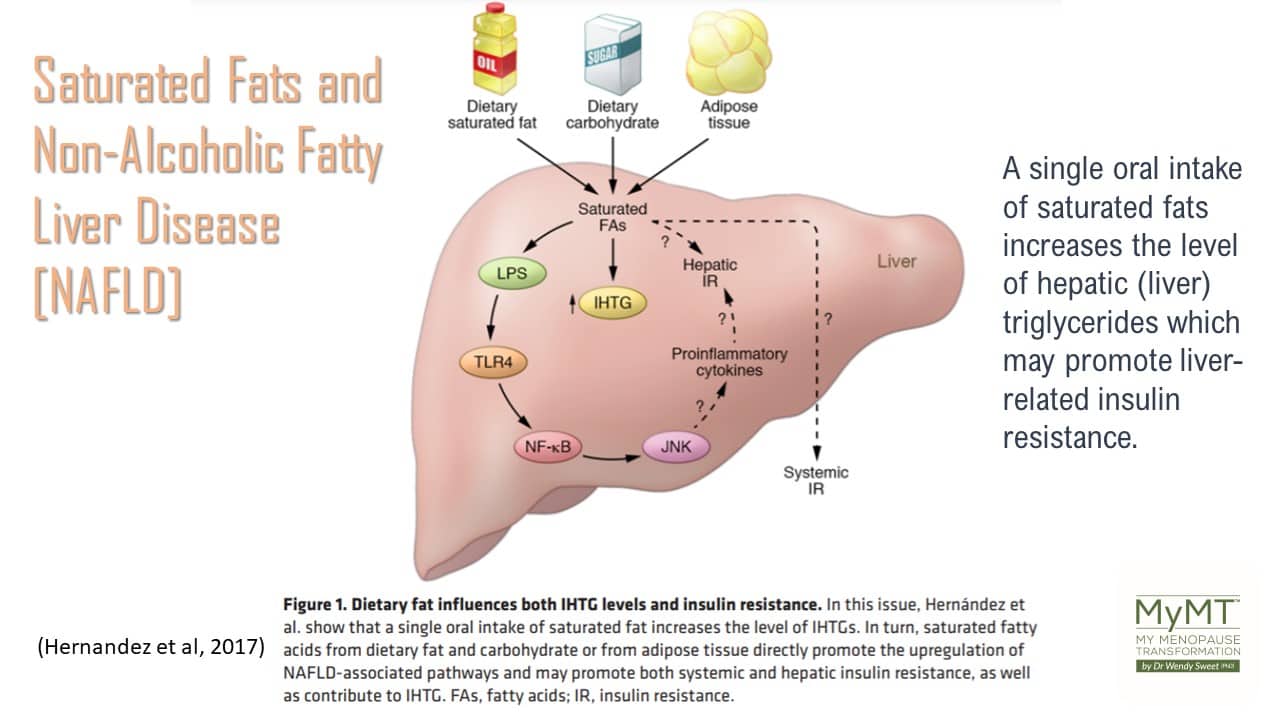
I have no idea if you have an over-burdened liver or not – only you and your Doctor do. But if you are putting on weight and feeling bloated and you are on oral tablets of Menopause-HRT and your cholesterol levels are changing, then please get your liver health checked. We are a generation of women who have had over 40 years of living in a fast-changing society, with lots of emphasis on changing food production and chemical consumption and toxins that are harmful to our liver health.
Hence, we must understand that if we want to lose weight and improve our health as we age, then our liver matters. Current research supports the effect of inflammation gathered over our lifetime on our changing health as we age.
Liver tissue is made up of lots of smaller units of liver cells called lobules. Many canals carrying blood and bile run between the liver cells. Blood coming from the digestive organs flows through the portal vein to the liver, carrying nutrients, medication and also toxic substances. Once they reach the liver, these substances are processed, stored, altered, detoxified, and passed back into the blood or released in the bowel to be eliminated. In this way the liver can, for example, remove alcohol from your blood and get rid of by-products from the breakdown of medications.
But here’s the thing – with the amount of fats and proteins that our liver has to process in a day, then other vital nutrients and mineral salts may not be able to be readily absorbed into the blood.
Women who have a high-fat and high protein diet and may be doing lots of high-intensity exercise or have a lot of stress in their lives, must also be cautious about their liver health. When women are continually exercising or feeling stressed, the liver is over-burdened with having to turn over glucose to fuel the ‘fight or flight’ adrenaline response.
Thousands of women become confused about why their cholesterol is increasing and end up on statins or endless supplements, but what they may be missing, is how to adjust their diet or exercise to match the scientific evidence on detoxification of the liver as we move through menopause.
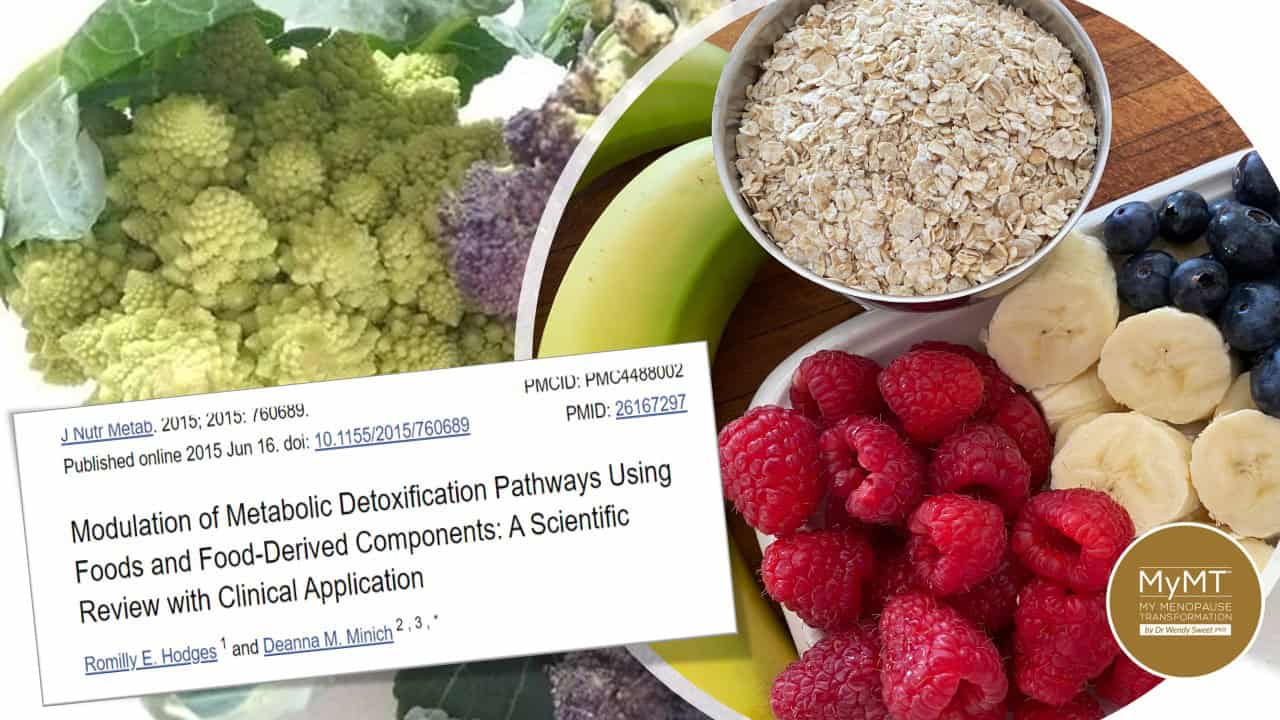
I have lots of strategies in my 12 week programmes, for you to tunr around your liver health, but here are two of my favourites:
- Eat mainly plant fats and until you improve your liver health, then decrease your total fat intake to around 15% of your diet, unless you are doing lots of endurance exercise. (In which case you can go up to around 20-25%). Many foods act as either inducers or inhibitors of enzymes that have bioactive compounds in detoxification of the liver and other organs, but the amount you have is important. Too much kale for example as well as other cruciferous vegetables, such as broccoli and brussel sprouts, can either activate or inhibit the enzymes that help to detoxify the liver – we need some, but not a lot it seems.

- Stretch in ways that help to lengthen your diaphragm. Also massage your liver when you can (in the shower is great). If you sit all day at a desk and your liver is compressed from fat that accumulates under the diaphragm as it did for me (and Linda below), then including more stretches for your liver and gall-bladder at the end of the day is a great habit to get into.
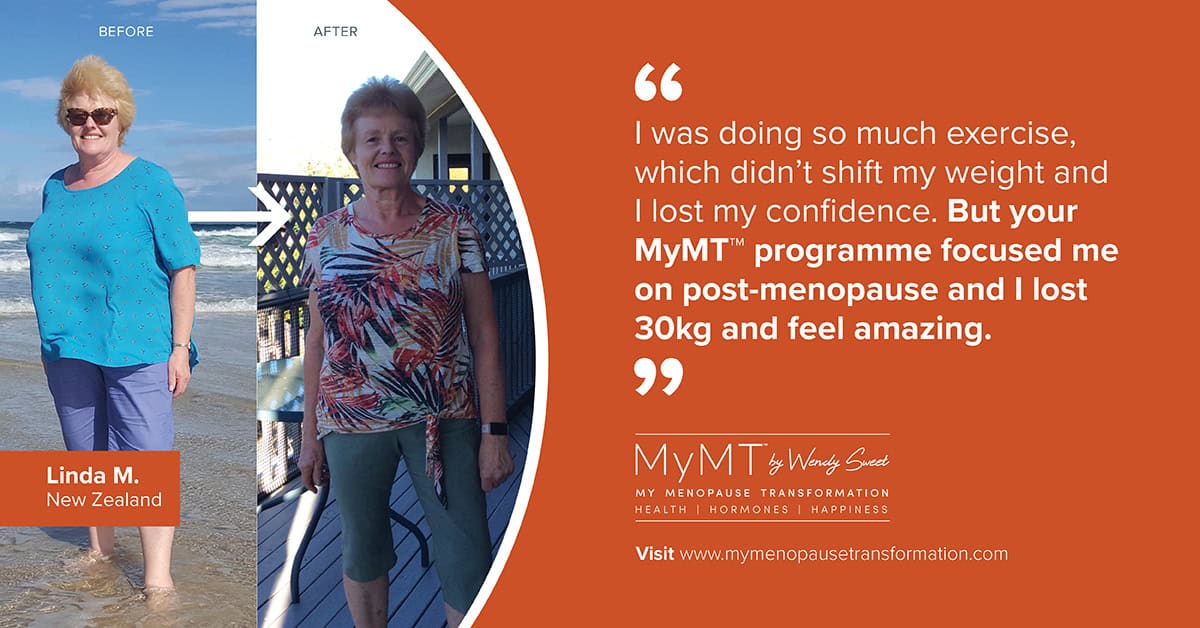
The ageing of our organs offers a ‘perfect-storm’ when menopause arrives.
This means that we have to learn how to make some lifestyle adjustments to accommodate these changes. Otherwise our weight gain creeps on and on as the years advance. With increased weight gain, then cardiac and metabolic health can change as we move into post-menopause. For too many women, what ensues is frustration and confusion, as, instead of feeling healthy and vibrant, they may feel exhausted, sick and overweight instead.
Health and medical researchers already know from research on our mother’s generation, that weight gain around the trunk at this time of life sends women into post-menopause heart disease, obesity and Type 2 diabetes. For many women putting on a lot of belly fat, or if you have the ‘hard-fat’ sitting around your abdomen, then please try to come on board into my ‘Menopause Weight Loss Program .
Why is it 3 months? Because that’s how long it takes for you to turn around your liver, reset your hormones for your ageing and discover how to change your nutrition, sleep and exercise habits so that you thrive at this stage of life. I can’t wait to help you.
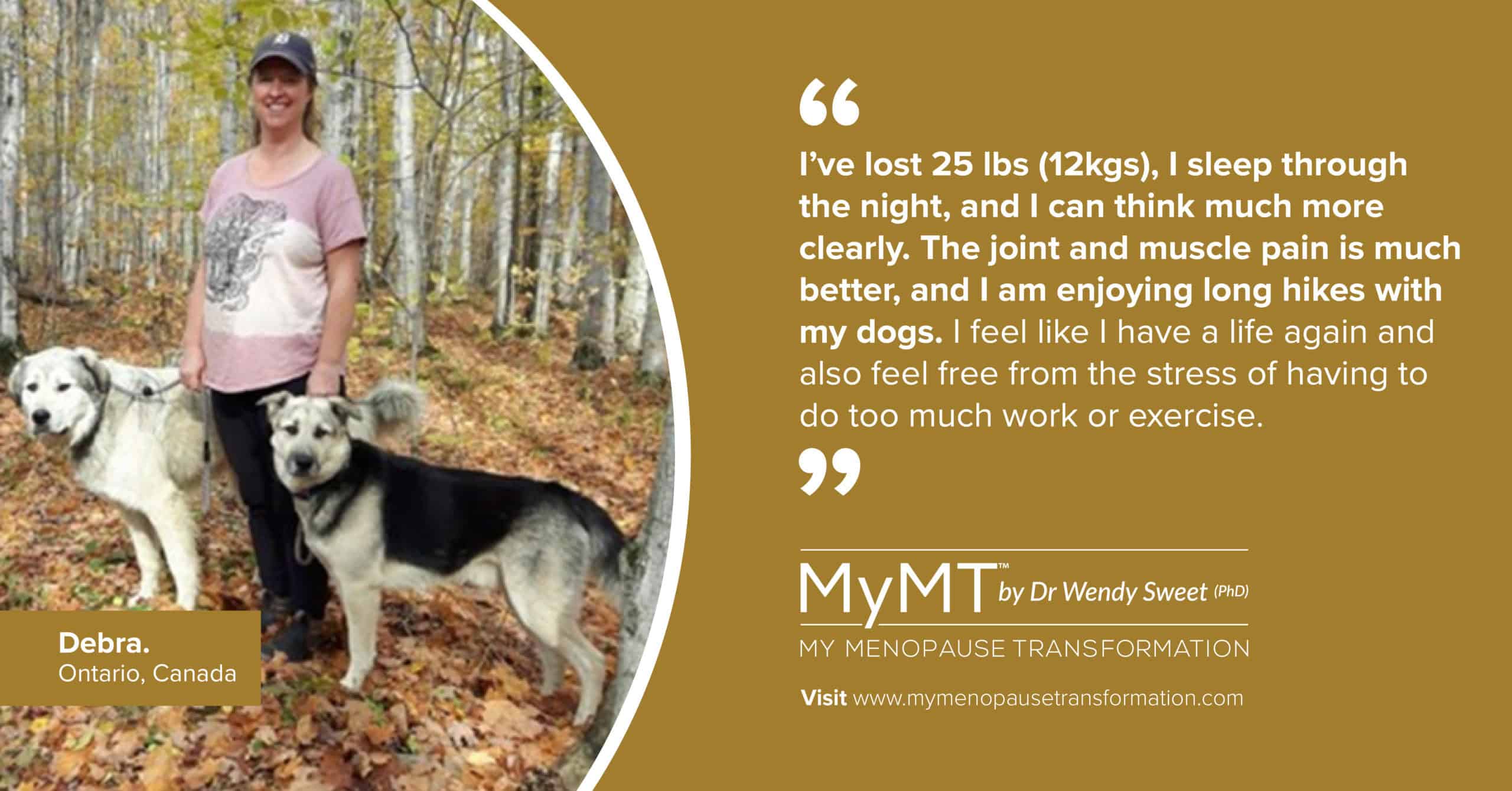
References:
Brady, C. (2015). Liver disease and menopause. World J Gastroenterology, 21(25): 7613-7620.
Cabot, S. (2010). Fatty liver – You can reverse it. Arizona, USA: SCB Inc.
Greger, M. (2020). How not to diet. The groundbreaking science of healthy, perminant weight loss. New York: Flatiron Books.
Hodges R. & Minich D. (2015). Modulation of metabolic detoxification pathways using foods and food-derived components: A Scientific Review with Clinical Application. J Nutr Metab. Article 760689.
Kim, H., Kissaleva, T. & Brenner, D. (2015). Aging and liver disease. Curr. Opin Gastroenterol. 31(3): 184–191.
Watanabe, S., Hashimoto, E. et al. (2015). Evidence-based clinical practice guidelines for nonalcoholic fatty liver disease/nonalcoholic steatohepatitis. J. Gastroenterology, 50: 364–377.
Wenxia Lu, Sainan Li,Jingjing Li, et al. (2016). Effects of Omega-3 Fatty Acid in Nonalcoholic Fatty Liver Disease: A Meta-Analysis. Gastroenterology Research and Practice, Article ID 1459790, 1-11.
